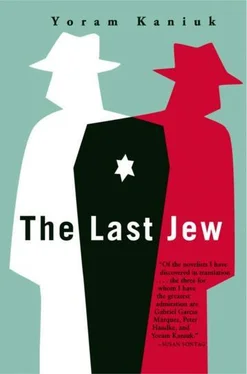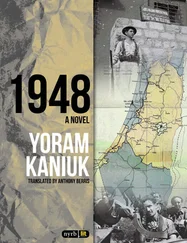On the third evening, they came to the crossroads of the desert. Above rose a mountain and on was it the holy house of the Shiite priests. In the distance, dawn illuminated the mountains of Moab and a profound serenity reigned over everything. Birds began chirping, when they came to the top Dana didn't find flowers but thorns, thistles, and nettle flowers she was afraid to pick because they blossomed only one day a year. They were ordered to say Salaam aleikum ya ahl el-kubur, which means Greetings to you who dwell in the graves. And at the same time, Ebenezer began blessing with head bent: El-salaam aleikum ya ahl el-duniya, which means Greetings to you people of this world. And then the old man there told them that if they forgot those words their only son would die within three months, their house would be destroyed by fire, and their name would be wiped off the face of the earth. Dana said: We don't have a son, and Ebenezer said: We will have a son and his name will be Boaz. Dana asked why Boaz, and Ebenezer said: Because he will be the grandson of Nehemiah. And when she asked what would happen if they had a daughter, he said: We won't have a daughter, we'll have a son.
From the moment he was born, Rebecca claimed that Boaz was her son, that she had held him in her womb as a pledge. Dana held the baby, suckled him, and was afraid to let Rebecca touch him. At night Rebecca started whispering her Psalms angrily and furiously, prayed to a lord of another world, a strange, hostile one, who once lived with her forefathers in cellars. Dana wept and told Ebenezer that Rebecca was praying for her death, and Ebenezer tried to calm her but didn't know how to say that in the few words he used. He said: I'll protect you, Dana. She hates me, said Dana, and wept. I'm so scared, she loved Samuel, I wanted to understand, I couldn't, I looked at my son, he doesn't look like me, not like his mother, he had green-yellow eyes like the eyes of a demon, he laughed, a laughing baby he was, he touched his mother and would turn his face away from her, and Ebenezer went to his mother and said to her:
Tape / -
You're praying for Dana's death, said Ebenezer. And she said: I'm praying to who I want and for what I want. You're not even the son of your father, not the grandson of your grandfather, you didn't come out of me, you came out of the coffin of a Jew who died of typhus and was buried in Jaffa under another name. Give me the only son I deserve. At night Rebecca yelled at the fence so they would hear: Ebenezer is the son of Nehemiah! Who else could be the father of a mongoloid who begets sons of a king if not a man who died on his wife at the shore of Jaffa to punish her for a life she didn't want to live? No Joseph would have begat a silent bird carver who tries to sleep with the daughter of a eunuch from Tel Aviv who begat his daughter from a charter translated from ancient Latin.
Dana heaped up pillows and boxes and blocked the doorway and Ebenezer paved a new path around the old house and Rebecca sat at the fence and wished for her grandson and couldn't see him. At night, no light was turned on in the house. Ebenezer sat in the house holding a rifle. Every noise made Dana Jump. One day, one of Dana's friends was brought who had a stomachache and volunteered to guard the yard and whenever he saw Rebecca approaching he aimed his rifle at her and said: I'll shoot you, and she giggled and said Shoot, fool, and he aimed, trembled, and didn't dare shoot until one day he crossed over the barricade and hired himself out to work in her yard.
Tape / -
Boaz was born in the nearby settlement, in a small hospital, on April third, nineteen twenty-eight. On that day and at that hour, in Tarnopol, Galicia, Samuel Lipker was born. Samuel's sire then wrote a great poem on his unrequited love for Rebecca Schneerson. Then he wrote a lament on the death of Jews that would be written again later on by a man named Lionel Secret. The lament and the love poem to Rebecca were the only two successful poems ever written by Joseph Rayna. But they were left with his clothes before he was shot to death. No one remains who will remember them except for one man who recited them to Ebenezer and then died with a piece of bread wet from the damp of the wall stuck in his mouth. Joseph wrote about the most horrible disaster as if he envisioned it. The words walked among ruins of Jews and a path strewn with human obstacles who didn't know what they hoarded in their minds, came to Ebenezer, who stood in Cologne and recited the lamentation and the love poem. In its words, Ebenezer heard a distant melody reminding him of his love for his mother. And Joseph Rayna didn't go to America to save himself because he thought that if he went there, he would betray Rebecca. And so, without knowing, Lionel Secret learned from Ebenezer the melody of the great lament he would write years later, and would restore the first love of his mother Rachel, her love for Rebecca Secret Charity and the great-granddaughter of her daughter, but by the time he wrote the lament, his mother was dead and buried in New Jersey under the name of Rachel Blau, faithful wife of Saul Blau.
Those are the annals of Israel. Abraham begat Isaac. Isaac begat Jacob, end.
Tape / -
When Mr. Klomin came to the settlement to see his grandson, Dana claimed that Rebecca had sent him to spy. Mr. Klomin came with the Captain, who had just returned from Rebecca's house. Rebecca stood at the fence separating her house from her son's house, and Mr. Klomin, who knocked on the door, didn't get an answer. He wanted to read to his daughter the six-hundred-page letter he had written to the High Commissioner. The Captain also considered that letter the piece de resistance of the life of Mr. Klomin, who started believing the rumors that had been making the rounds of the Yishuv for some time that the Captain was secretly inciting the Arabs to revolt (he didn't know exactly against whom) and therefore Mr. Klomin believed that that inciter should be used to remove the foreign government from the Land by means of his loyal or hidden servants. The Captain's generosity enabled the recruitment of about twenty new members into the party, but the source of his money became more suspect when Shoshana Sakhohtovskaya returned from Egypt. Shoshana was the daughter of Nathan, Nehemiah's old friend, and married a Jewish officer in the British army who was stationed in Cairo and he was said to own two factories for holes in pennies (one for the hole of a penny, and one for the hole of a tuppence). Shoshana told with a fervor that almost made her face bearable, that the Captain's newspaper sold only thirty-four copies, was merely a deception and behind it, she said, hid a secret, international, maybe even religious body, she almost shouted, a body whose purpose is to convert the Jews of the Land of Israel to Christianity and keep the Land from turning into a Zionist base. The Captain was too polite and in love to try to refute those accusations, which seemed exaggerated even to him, although he did see something in them that was fair to some extent. In his opinion, the accusations were partly correct, but imprecise, maybe even malicious, and he pledged himself by his nobility, which he occasionally called "South American nobility" and "Swiss courtesy," to silence and would wring his hands, and say: I said what I said out of love, I don't go back there, that's a fact, I'm no longer friendly with the English, I live in the settlement, and the proof was so dubious that everybody almost tended to accept it and Shoshana Sakhohtovskaya sat at night, gobbled up all the oranges on a tree she had planted with her own hands as a child. She heaped up the peels in a pyramid and when a black bird with a yellow beak stood on the tip of the pyramid and nodded its head and an owl screeched at night, Shoshana burst into bitter weeping, and called out: At least I have someplace to go back to. The Captain didn't explain what places he didn't go back to, and people wondered about those places, for a person generally isn't born in Argentina, Switzerland, and the United States. He has to choose, said those who were considered experts in the ways of the world. The elders of the settlement, who were grateful to Rebecca for Nehemiah and for Nathan's happy death, said: The Captain's Greek Orthodoxy is not exactly the religion that prevails in Argentina, the United States of America, or Switzerland, so when the Captain went to get his things that would come three times a year in a ship to the port, a few members of the settlement watched him and with their own amazed eyes (Mr. Klomin stood with them, even though he was ashamed of it) saw a gigantic trunk taken off, placed on the shore, and a British officer loaded it on a cart and took it to the shed, where the Captain was waiting. An aged consul stood next to him, eating an apple. The case was opened, there were new uniforms there, medals, and hats with padded visors. They also saw how the Captain was granted new insignia, which the aged consul pinned to his epaulettes, and he shouted unambiguously in a loud voice so they too could hear that the Captain was now promoted to the rank of colonel and the adorned scroll in the consul's hand was seen even from where they were hiding. The insignia were made of gold, the new visor was woven of silk fibers, silver and gold.
Читать дальше












